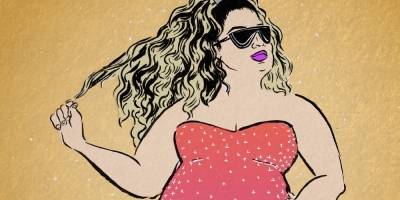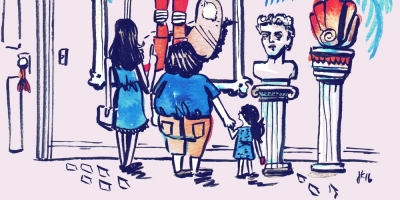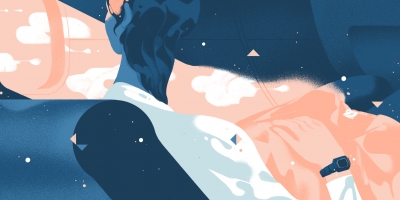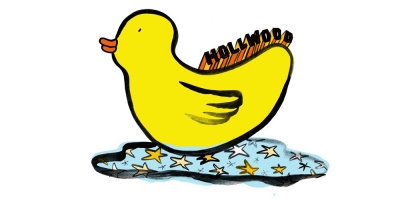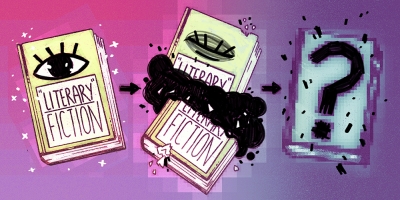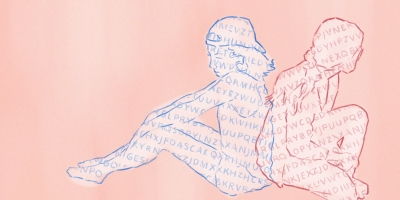Nonfiction
The Disenchantment of Literary Fiction
by Todd Dillard

The first time I met Neil Gaiman was in a shopping-center bookstore called Bookstop. It was the bookstore of my childhood, situated between a Wherehouse Music and a Mexican restaurant called The Casa, and I would bike there at least once a month to thumb through Dungeons & Dragons manuals or steal the free AOL-minutes CDs stowed at the often-vacant checkout counter. As far as bookstores go, it was only remarkable in its unremarkableness. The outside was faux stucco the color of a retiree’s sunburn, and the double-glass doors opened into rows of shelves divided by a single channel filled with display tables. Shelves wrapped around the walls, starting at the checkout counter and ending at the newsstand by the storefront windows. It was a no-nonsense setup; they sold books, and only books, and if you wanted something besides books, well, you were in the wrong place.
I’d always been a voracious reader, but one limited to my homework assignments, my school’s library, the books my family gifted me on birthdays or Christmas, or what I read at the comic-book store. In the summer before my fourth grade year, I decided it was time to venture out on my own. With an allowance-thick wallet, I biked to the shopping center, abandoned my bike on the sidewalk, and opened Bookstop’s doors to make my first solo book stop.
“Need help finding anything?”
The bookseller was tall, pale, and skinny, wearing once-black-but-washed-to-gray jeans, a black, long-sleeve button-down, and black sneakers. His black hair threatened foppishly to cover his eyes, and his smile was so disarming I felt guilty for not being, you know, armed.
“Yes please thank you,” I said.
To shop at a bookstore is to relinquish a part of yourself—even if you know what exactly you want, there is always a chance a better book for you is lurking on a shelf you haven’t perused. So I was relieved, in the face of so many options, so many ways to become lost, that there was an expert readily available. After a few questions about preferences and what I read and what I was looking for, the bookseller asked me to follow him. We wound around display tables, deeper and deeper into the store, past the glossy-covered cookbooks, the matte-covered self-help books, the books on Civil War history and political science, until I could only make out the daylight glow of the front doors over the tops of the marked-down coffee-table editions. Then the bookseller turned left and, after a short walk, paused and handed me a white mass-market paperback with gold letters embossed across the cover that read: Good Omens.
“I think you might like this,” he said.
I opened the book and began to read, and the bookseller wandered away, giving me some privacy. Because I liked what I read, I also picked up another book by one of its authors—Neil Gaiman—titled Neverwhere. I paid, wrapped the plastic bag containing Neverwhere and Good Omens tight around my bike’s handlebars, and biked home.
It wasn’t until that night when I looked at the author photo on Neverwhere that I realized Neil Gaiman had suckered me into buying some of his books.
A week later, I returned, excited about what I’d read, eager for more, for Neil Gaiman to again point me to the right books.
Only Neil Gaiman didn’t work there. In fact, according to the clerk behind the counter, no bookseller of that description had ever worked there.
I wouldn’t see Neil Gaiman again for twenty years.
I was, officially and irrevocably, a reader of fantasy.
It seems every few months an online newspaper or journal publishes another piece on why we shouldn’t read young adult (YA) novels or genre fiction. While it’s clear most of these pieces are click-thirsty humbuggery with an etymology that dates back to articles on the dangers of watching Beavis and Butthead or doing the twist, I always read them, and I am always irritated after I read them. There’s a presumption in them I can’t get over—it’s rarely “Why I don’t read [X],” it’s usually “Why you shouldn’t read [X],” as if the winding pathways of one’s preferences need to be wrangled to parallel another’s. There’s no logic to this; you might as well tell me how I, now that I’m in my thirties, should have spent my childhood because you enjoyed yours so much.
I’m often nonplussed by the lack of introspection in these editorials and essays. Usually, when confronted with a stark and recurring difference in taste, an essayist might dig into why such a difference exists, what it means, what it implies. And there are many questions to unpack in the need to excise the literary from genre: “Why is reading for plot inferior to reading for complexity?” “What is it that makes a book ‘literary’?” “Are ‘literary’ books that employ the tropes of specific genres appropriating those genres, or are they literary versions of those genres?” Also: “Who cares?”
Rather than delve into these complex questions, and bolstered by the assumption that readers of “literary” fiction possess superior tastes, these essayists focus entirely on bashing books they admit they rarely or never read.
And this is problematic. It’s been said in other essays, but the classification of genres carries no actual implication for quality. It’s just a way to organize books so they’re more likely to reach their intended audiences. Even putting questions of quality aside, there are some serious issues that need addressing regarding “literary” fiction—its homogeneity, its recycling of bourgeois struggles, its shifting identity in an MFA-saturated literary scene.
But worst of all, in their cases for “literary” fiction, these essayists forget the very act of reading, that it is ultimately something readers should enjoy. There’s an incoherent reach here, sometimes explicitly stated, sometimes implied, that literary fiction is a better read because it’s a truer form of fiction, more adult, more in line with how our minds should be.
It’s not.
It’s time we retire the term “literary” fiction.
Maybe it’s time we admit “literary” fiction is dead.
The first bookstore I worked in was the sister store to the Bookstop by my childhood home, located across town in the Montrose area of Houston. If there is majesty in a bookstore simply because of the miles of words buzzing within, there’s a particularly delightful kind of majesty in a unique bookstore—a certain way that negotiating the aisles lends itself to discovery, a willingness to give in to wandering, a feeling that you might be in a book yourself.
The Alabama Theatre Bookstop was one of these stores. In 1984, Bookstop acquired the Alabama Theatre, a single-screen movie theater built in the 1930s. They retained the exterior but renovated the interior to keep the art deco style intact. This commitment to the theater’s unique architectural aesthetic resulted in one of the most interesting and beautiful bookstores in the country. The front checkout counter was where the theater had once sold tickets; the back checkout counter was previously the concession stand. The mezzanine housed all our travel guides and language books, and the projection booth had been converted into a café where one of our regulars—a UPS employee in architecture school—would sit at a cramped table and build miniature cardboard buildings while sipping on black coffee. The levels of stadium seating had, instead of seats, teal bookshelves, and as you moved down the center aisle, you passed the children’s section, then poetry, fiction, science fiction and fantasy, self-help, cookbooks, and non-fiction, until you climbed up to the newsstand, which ran along the wall where the screen used to be and was bookended by a forty-foot Egyptian-themed mural.
My coworkers were characters, too. Jim, the front checkout regular, had one eye and would clean out his socket scum when he thought no one was looking; Rosalinda could pivot from sweet to serious to sarcastic so dexterously I think everyone who met her fell a little in love with her; Reed, a fellow fantasy/comic nerd with the voice of an opera singer, would sing as he closed down the café at night, his profound baritone spilling over the second-floor railing and filling the entire store.
There is magic in such a place, in such people, and I was thrilled to be a part of it.

The Alabama Theatre Bookstop. Photo by Jim Parsons/Houston Deco
But there was a disenchanting element in being a bookseller, too—everything, from building display tables to organizing sections of the store, was couched in presentation. Readers of this book might see it and then be interested in the books around it, might buy something. Fantasy jostled with science fiction and graphic novels, the YA aisle meandered into the teen section, autobiography and memoir faced history.
Genre was not an indicator of quality, it was a guide to help booksellers organize the store. The Time Traveler’s Wife was shelved in the fiction section because it shared equally elements of romance and science fiction, and it made no sense to split our stock between those two sections. The Book Thief was shelved in the teen section because its protagonist was young, but its themes were darker than what some thought appropriate for young adult readers. A collection of Ray Bradbury’s short stories was shelved in fantasy/science fiction, even though he received a Medal for Distinguished Contribution to American Letters. The Devil Wears Prada shared shelf space with White Teeth and As I Lay Dying, and so on.
To xenophobes concerned with what is and isn’t literary, this might seem like a ghastly mess. To me, a bookseller, it was just how I shelved the books. I would no more assume the quality of a car changes based on where it’s parked than I would the quality of a book changes based on where it’s shelved.
There is a darker side to being a bookseller that, to me, reinforces this. A few times a month, I would have to go through my sections and, with a scanner that looked half like a satellite phone and half like a laser-tag gun, scan book after book, culling the paperbacks that hadn’t had any copies sell in the last three months or more. If copies had sold, my “gun” would chirp happily, and I’d move to the next book. But if I scanned an ISBN and the gun made a sound like a tiny police siren, I had to pull all copies of the book off the shelf, stack them on a hand truck, and reorganize the shelf so the titles that were selling were more prominently displayed, usually by having their covers facing outward.
Once it was full, I’d cart my hand truck to the store’s warehouse and, usually while listening to the latest Paste Magazine CD sampler on a tinny boom box owned by our receiving manager, I’d tear the covers off the books, then collate the covers into one box and bin the coverless books in another. The covers were shipped back to publishers to obtain a small refund. The books I tossed in the two-ton recycling dumpster behind the store.
I must have done this to thousands of books. Fantasy, science fiction, literary, romance, YA, memoir. Whether a book was “literary” fiction or “genre” fiction didn’t matter.
All their covers went into the boxes together, and their pages, together, were flung into the dumpster.
Writers of anti-YA and anti-genre think pieces want to save you. They want to stop you from damaging yourself, from wasting your time and dollars and finite brain cells and the real estate of your imagination. They warn us about these types of books the way our mothers warned us about drinking caffeine as children, as if consuming too many of them could stunt our growth.
“Adults should feel embarrassed about reading literature written for children…[T]he YA and ‘new adult’ boom may mean fewer teens aspire to grown-up reading, because the grown-ups they know are reading their books.” —Ruth Graham, “Against YA”
“These stories are the juvenile equivalent of pornography: They aim to gratify base desires as voluptuously as possible…There is so much wrong with this stuff ideologically that it’s easy to overlook just how meager it is aesthetically, what thin gruel for the imagination.” —Gabriel Roth, “My Kids Read Only Subliterary Branded Commodities. Yours Probably Do, Too!”
“…[F]antasy leaves me waiting for the other shoe to drop, unable to settle into the story. Somewhere down the line, I am convinced, something will happen that will shatter my willing-suspension-of-disbelief comfort zone. Why would anyone want to willingly expose themselves to that disappointment, I wonder?” —Graeme McMillan, “Why I Can’t Trust the Fantasy Genre”
“It’s time we took a frank, retrospective look at the past few decades and acknowledged that we have systematically deprived thousands of children of their literary inheritance…” —Joe Nutt, “Why young-adult fiction is a dangerous fantasy”
These writers don’t find the need to mention the problems steeped in so-called “literary” fiction: the distracting lack of diversity, the repetition of middle-class ennui, how certain “literary” authors are actually authors of genre fiction (Vonnegut, García Márquez, Atwood, or, more recently, Kelly Link, Helen Oyeyemi, Aimee Bender), the fact that for every ambitious literary novel there are dozens of derivative ones that still get better press than better genre novels.
This is not to say genre fiction also doesn’t exhibit these problems. But there is evidence that people are attempting to address them. Take the recent Sad/Rabid Puppies fiasco among readers of science fiction and fantasy. The Sad Puppies are a collective of alt-right/neocon fans who felt the Hugo Awards were being awarded based on race, gender, sexual identity, and ethnicity, rather than on merit. Because the Hugos are one of the few literary awards that determine winners based on fan vote and not committee, these neocons attempted to take over the ballots in protest of perceived slights and “forced” diversification. In an overwhelming response, their vitriol was shut down by SF/F’s larger fan base, and for two years running, the Hugos have seen some of the most diverse winners since their inception.
But what of “literary” fiction? What are its proponents, its authors, its readers doing to address the fact that, as noted by a Lee and Low Survey on diversity in publishing, “the number of diverse books published each year over the past twenty years has been stuck in neutral, never exceeding, on average, 10 percent.”
These essayists want to save you.
But can they really make a case that “literary” fiction deserves you?
My first job in New York City was in another of our country’s unique bookstores—Housing Works. Part café, part used bookstore, part event space, Housing Works is a fantastic nonprofit entity that helps those with HIV/AIDS, usually by providing them housing assistance if their finances have been decimated by medical costs. Like many shops in Manhattan, it has a small, windowed storefront and an interior that extends deep into the store, so you walk into it feeling as though you are being consumed by a leviathan with books instead of teeth, tables and chairs instead of guts and bones.
I worked in the levels below the main shopping/café area, in an expansive basement with creaky wooden floors, fluorescent lighting dim as winter twilight, corners smoothed by herds of dust bunnies, and shelves so cramped I could only negotiate them by sliding sideways down the aisles they formed. There were books everywhere: stacked on desks, piled on aluminum sorting tables, spilling out of boxes, avalanched across the floor. And there was a smell to it all, too—a delicious, wonderful smell of well-thumbed pages and ink, a musk that, to a lover of books, is sweet as any perfume.
My job was to sort through the books and add them to the online database/bookstore, then scurry around the shelves hunting for books, fulfilling orders I then packaged up and gave to our UPS vendor. Some of my favorite New York moments involved piling Housing Works’ elevator with orders, slamming the elevator grate shut, and rising up to street level (seemingly right out of the sidewalk) to the surprise of tourists and passersby to hand my orders off to our UPS guy. It was good work; I was grateful to be part of an organization with a greater purpose than profits, glad to be working with my hands, relieved to be near so many books, and charmed by the beautiful chaos of it all.
And it was, truly, chaotic. Because we shelved books as they came in, there wasn’t anything remotely resembling a classical approach to how we organized our wares. Handjob how-tos shared shelf-space with Proust. Completing an order for all the Series of Unfortunate Events books would likely involve visiting a dozen shelves, including, quite possibly, the lower level of the store, a dimly lit, dank room so dungeon-like I had to steel myself to enter it.
This may seem like a nightmare to some, but I found it thoroughly enjoyable. It was refreshing, having a checklist of orders, plunging into the depths of the shelves, emerging with texts I’d never seen before, titles my eyes would’ve otherwise never gazed upon, pages my fingers would’ve never turned. The shelf organization contrasted every bookstore and library I’d ever known; absent a map, experience, or a guide, you could literally become lost among the words.
I mention this because this kind of system seems to be where the majority of book purchasing is headed: the shelves no longer matter except as storage. The products are ordered numerically and organized electronically in online shopping environments. The physical space books share with other books gives you no information about them, except maybe when they joined the inventory. Now the most common link between books is an algorithm derived from purchase history, played out in Amazon’s “Suggested Reads”: “Readers who purchased Jemisin’s The Fifth Season also bought Martin’s The Song of Fire and Ice,” etc.
“Literary” fiction seems poised to suffer from this purchasing shift the most. It’s the least evocatively named classification of books, the least specific and therefore the least helpful. A quick Google search turns up a few think pieces that discuss it solely in terms of industry and “literary” awards, plus this definition from Wikipedia: “Literary fiction comprises fictional works that hold literary merit; that is, they involve social commentary, or political criticism, or focus on the human condition.”
This is sophistry—books of any kind and at any level, genre or otherwise, present conflict that is social, political, or based on the human condition.
Outside the most obvious cases of genre, differentiating “literary” fiction from genre fiction has become increasingly difficult. Better genre works are being written, certainly enough that the idea that only “literary” fiction has “literary merit” is laughable. “Literary” fiction continues to borrow tropes from YA and genre fiction: time travel, bizarre narrators, impossible technology, dystopia, zombies, superheroes. The list goes on.
So when do we realize that using “literary” fiction as a way to classify literary works has outlived its use?
I’m reminded of a panel at my first or second AWP (they all blur together), where [Famous Poet X] was asked a question resembling this: “Given its occasional use of stanzas, line breaks, different ‘found’ forms, and how, intentionally or not, prose poetry is written with ‘lines’ just because of how the text is confined by the margins, what actually constitutes a prose poem? How would you define prose poetry?”
[Famous Poet X]’s reply was sharp and to the point. “Who gives a shit?” she said.
The spirit of this response applies to the over academia-izing of all things, well, “literary.” Even if you assume there’s a quantifiable “literary merit” to “literary” fiction that other genres may or may not have…
Who, really, gives a shit?
There has never been a more compelling, more exciting time to be creating art with words. Video games, interactive stories, graphic novels—all of them are changing our methods of consuming narratives, and all of them will have indelible impacts on the future of writing. As a result, the term “literary” has become too small, too literal. It contradicts itself. Take Neil Gaiman’s Sandman series. It’s a comic book, and a novel, and a graphic novel, and one of the most important written works of the last thirty years. It is complex and unique and cannot be replicated, but none of these anti-fantasy, anti-YA readers would comfortably call it “literary.”
It is. And it isn’t.
But, really, who gives a shit?
“Literary” or no, it is, simply, fantastic.
The second time I met Neil Gaiman was in New York City. My friend, for my birthday, purchased us tickets to see Gaiman read Peter and the Wolf with a live orchestral performance. On one of those cold winter nights that hang over you like they’re threatening to assault you, my friend and I made our way to the southern tip of Manhattan, into a silver building overlooking the Hudson. I admit I was nervous; I had long ago realized my childhood self probably hadn’t had a chance encounter with one of the greatest fantasy authors of all time, and the tug of wanting to see Neil Gaiman read was at odds with my worry that I’d confirm one of my favorite childhood anecdotes was a lie.
My friend and I sat down, and Neil Gaiman walked onto the stage, tall and skinny and wearing all black and with hair foppishly threatening his forehead. He talked for a bit (if I remember right, this was the night he publicly announced his engagement to Amanda Palmer), and he read some of his work, and then he read Peter and the Wolf, and it was lovely.
Afterward, there was music, and Neil Gaiman wandered among us, and damned if, after watching him and listening to him for an hour, I couldn’t decide whether the Neil Gaiman in front of me was the same bookseller who’d helped me at the Bookstop twenty years before. I remember that at one point I was looking at him, and he happened to look at me, and he smiled, and he seemed very nice, and I had every opportunity to walk up to him and tell him my strange story and ask if he’d ever been to Houston, say, about twenty years before, and changed a young boy’s life by introducing him to fantasy, to magic.
Instead, I turned around and walked away.
Lost among the need to classify books as a way to either sell them or presume their merit—forgotten in these anti-YA/genre essays—is the very precious act of reading, the very magical aspect of being a reader.
This isn’t to say books are above critique. If anything, it’s to say that books, specifically, are the things to critique, not genres or readers of genres.
If it’s not dead already, the moniker of “literary” fiction is dying, its meaning atrophying as it appropriates aspects of YA books and other genres, its implication of literary merit dubious at best, its proponents in dire need of realizing that “literary” fiction needs more diversity, more variation, more than the pompous assery of presumed superiority.
The very idea of Neil Gaiman recommending Good Omens to me is ludicrous.
But it is also beautiful, and even though there’s a 99.99999999999999-plus percent chance it’s entirely a case of projection, of mistaken identity, of a child with dreams clouding his vision, there will always be that slim margin that says it may have happened.
And that fantasy, as a reader of fantasy, is precious to me. Because reading YA or reading genre fiction isn’t ultimately about plot, complexity, or recurring tropes. It’s about the specific kind of magic that each genre offers its readers—the kind of magic conjured from wandering aisles, fingertips brushing spines and titles—and for me, reading the fantastical, the impossible, instills within me a hope that the fantastical and the impossible is out there, somewhere, and maybe someday it will reach me.
Or maybe it already has.
